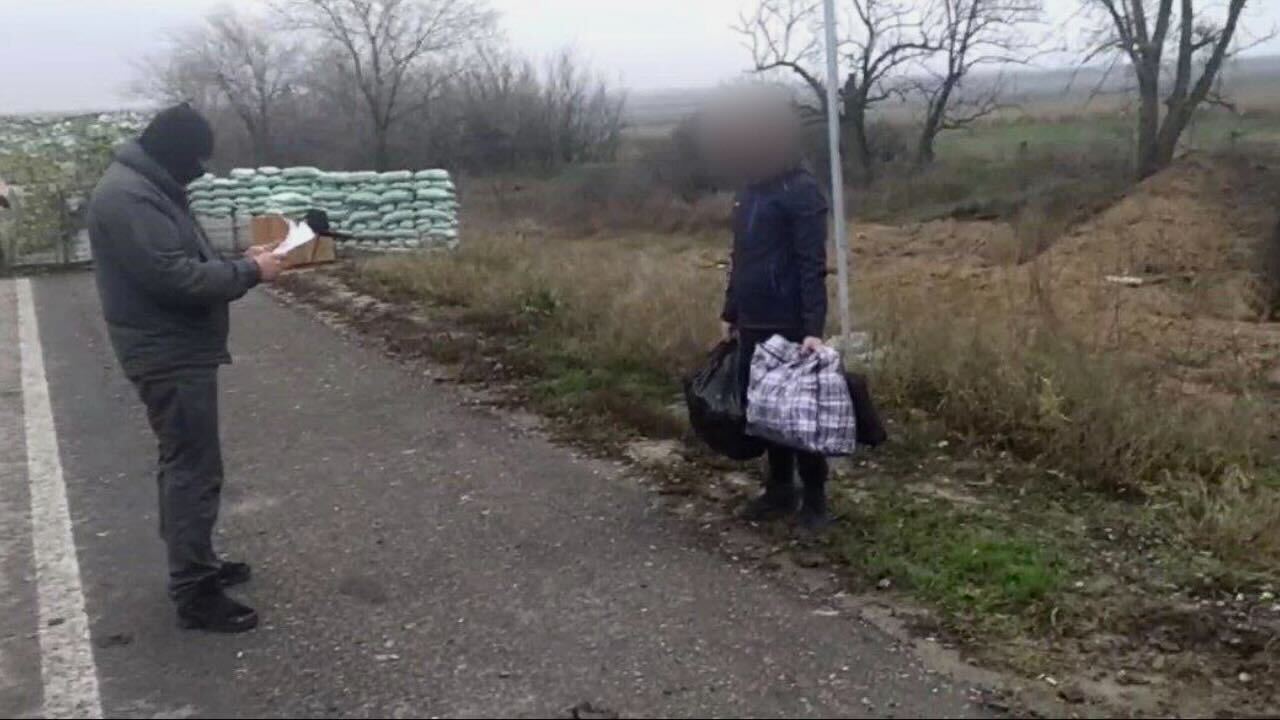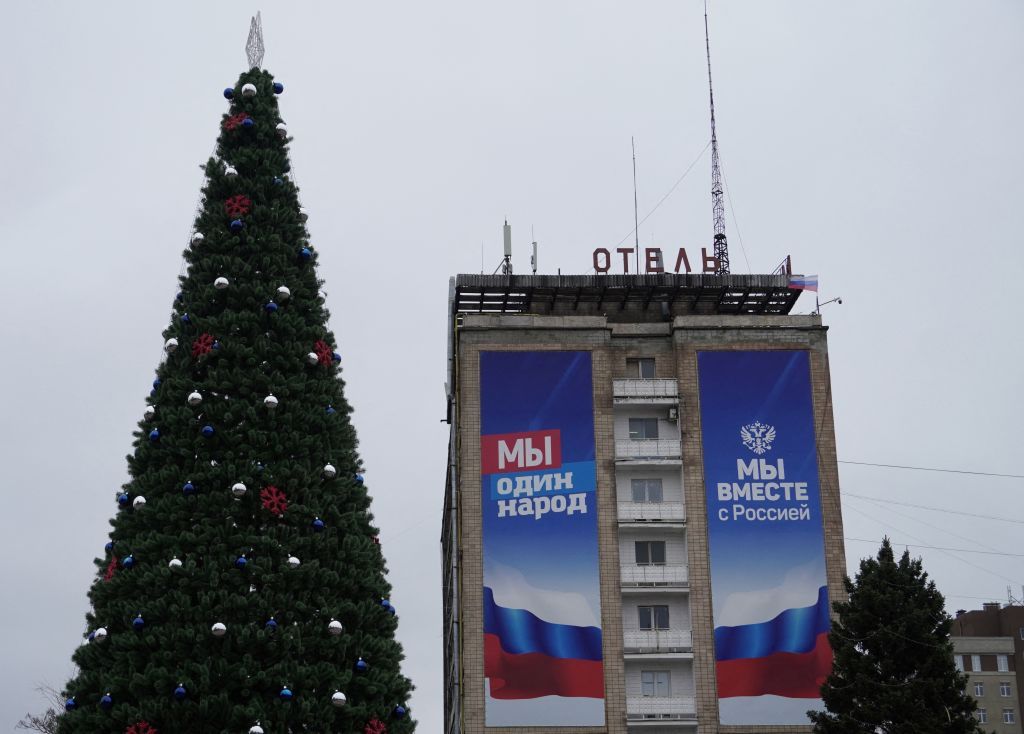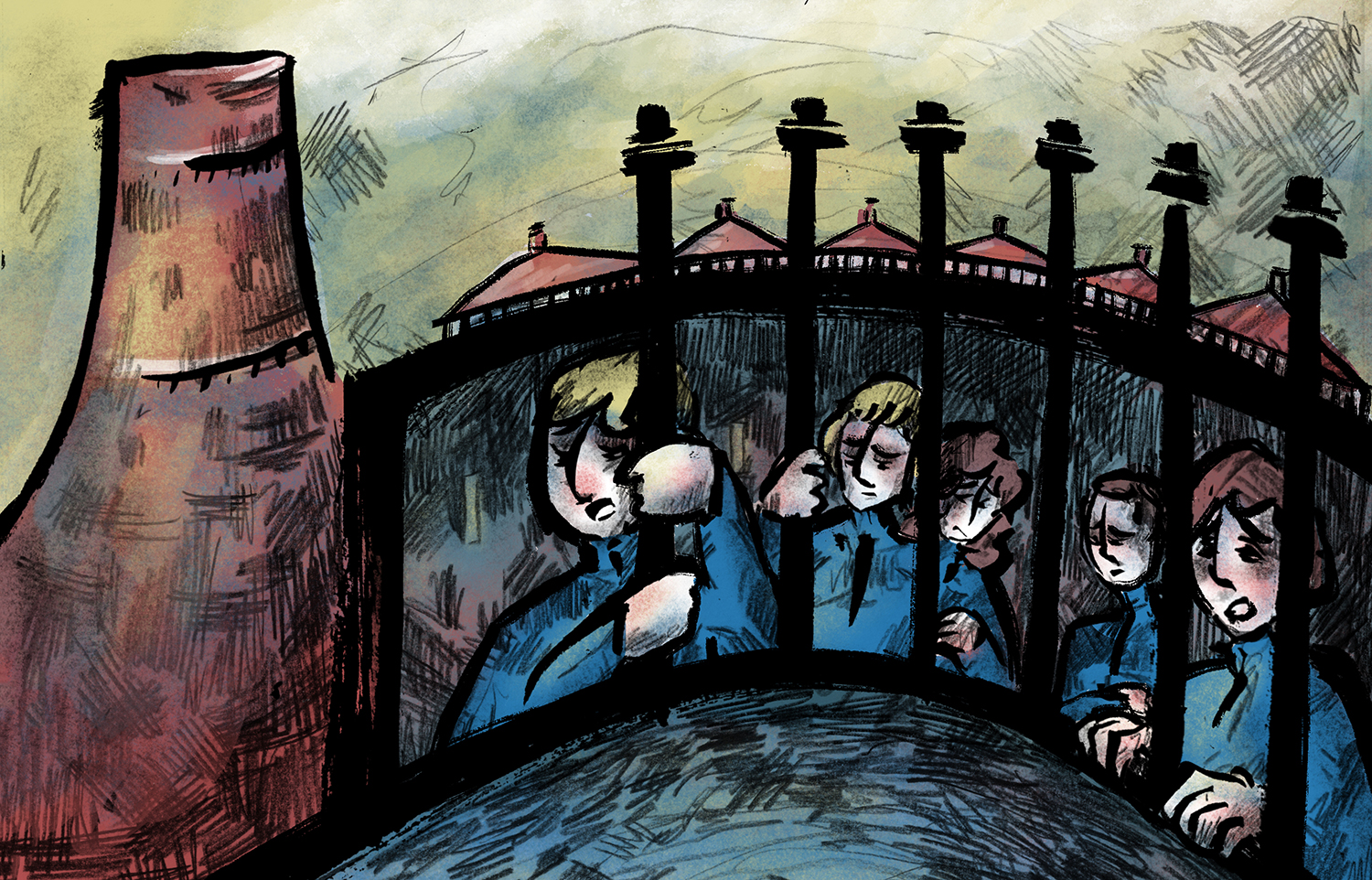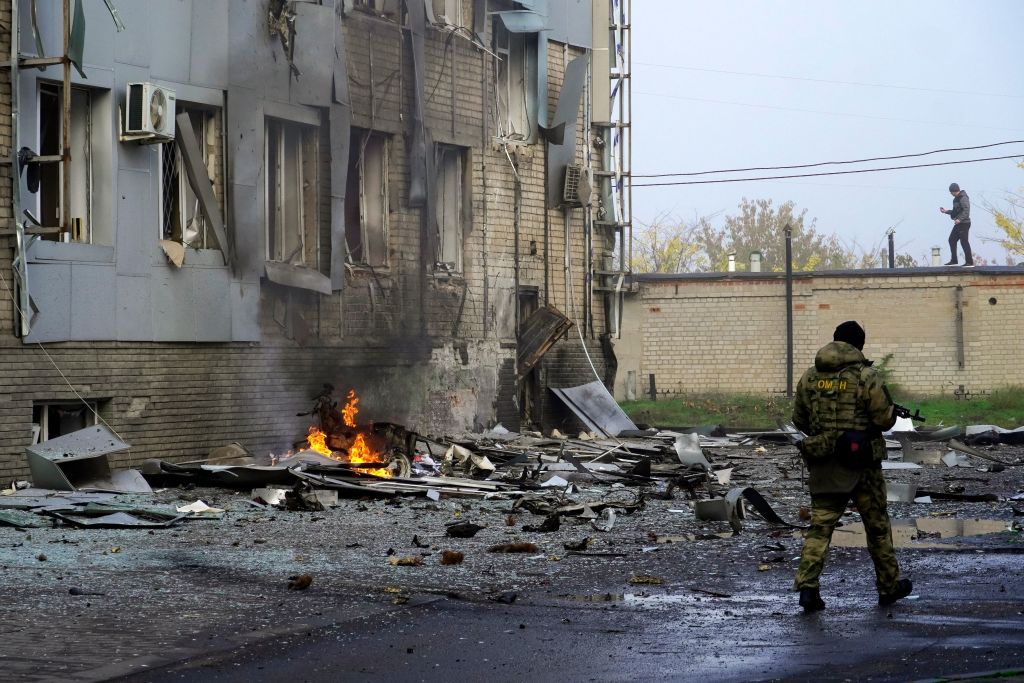Editor’s Note: For this story, the Kyiv Independent talked to residents who recently left Russian-occupied Melitopol but still have family in the city. For their safety, we do not identify them by their full name.
Maryna didn’t need to see the faces of the soldiers who had kidnapped her.
Even though they put a woven bag on her head, she already knew some of them by voice.
They had come to her house before, to ask questions about the residence and “stuff their faces” with apples she had sitting on her windowsill.
When they demanded $1,000 to allow her to keep the old car she and her husband used to drive on her farm, she agreed, thinking they would leave her alone after that.
Except, they didn’t. Seven soldiers, who used to roam her village near Melitopol, came knocking at her door that one September morning.
She already knew where they would take her. She never hid her pro-Ukrainian stance, she told the Kyiv Independent months later, in the city of Zaporizhzhia.
“If they don’t like someone, they just take this person into a car and abduct them,” she said. “Your relatives will never know what happened to you.”
The Russian soldiers took her to a small, disgusting cell in a former pre-trial detention center in Melitopol for a “talk,” as they put it.
“One was asking the questions, and the other beat me,” she recalled. She was beaten whenever her answers didn’t suit the interrogators or when she replied in Ukrainian.
“They threatened to break my nose, beat me on the floor, and hand me over to the Chechen soldiers for ’entertainment,” she said.
She was beaten three times over the span of 22 days before being released in a prisoner exchange on Sept. 27. The Russian troops filmed one of these beatings.
Maryna’s story is just one of many similar accounts from occupied Melitopol — a city ruled by fear, where Russians behave with impunity and can throw anyone into a torture chamber at any moment.
Owning hryvnias, speaking Ukrainian, or having the Ukrainian mobile e-government app Dia on their phone could land Melitopol residents in one of the city’s “basements” for a “talk,” meaning interrogation under torture.
Anyone refusing Russia’s forced conscription, ongoing in Russian-occupied regions, can also end up in a cell, beaten, shocked with electricity, and severely injured, locals told the Kyiv Independent.
Ever since Russian forces captured Melitopol in March 2022, residents of the southern city of Zaporizhzhia Oblast have grown accustomed to “disappearances” that often take place in broad daylight.
“They can simply come to your house without saying where they take you or why,” Maryna said. “And it’s a very common thing.”
Over 1,000 people have been abducted since Melitopol fell to Russians, its exiled mayor, Ivan Fedorov, told the Kyiv Independent. It’s his estimate based on his sources in the city.
He, too, had been abducted early on. However, his case was so widely publicized that he was swapped in a prisoner exchange in March 2022. He now works from an office in Zaporizhzhia, the regional capital.
Over 500 people are still missing, he said. “But it’s hard to count because everyone’s afraid to talk about it.”

A city ruled by fear
Fedorov estimated that nearly two-thirds of the 150,000 residents who used to live in the city before the invasion left. Some 50,000-60,000 locals stayed, while others came to take the vacant flats and houses.
Those who left were replaced by people who once lived in occupied Donetsk Oblast, including Mariupol, and “a lot of Russians,” said the mayor.
The city, located between Kherson and Mariupol, several kilometers north of the Black Sea coast, was also turned into a heavily fortified military base since its capture.

Melitopol was declared the so-called capital of the occupied part of the Zaporizhzhia Oblast on March 19, following Russia’s sham referendums in occupied parts of the oblast at the end of September 2022.
Fake referendums were also held in occupied parts of Donetsk, Luhansk, and Kherson oblasts.
The checkpoints between Russian-occupied territories and Ukraine have been closed since December, forcing people to go through Russia to escape the occupation.
As in all occupied territories, Russian rubles replaced Ukrainian hryvnias as the main currency. It’s forbidden to speak Ukrainian, and a Russian curriculum replaced the Ukrainian one in schools.
Those who stayed behind are afraid to talk to strangers “because it’s too dangerous,” Melitopol residents who asked to remain anonymous told the Kyiv Independent through their friends and relatives who left the city.
Maryna keeps in contact with her relatives in the occupied city, which is why she knows about it, despite the spotty internet and Russians constantly checking phones.
Anastasia, another refugee from Melitopol who fled last summer but still has relatives in the city, had a very similar description of what it’s like.
She calls her parents on the phone and makes sure to stick to the most trite, innocuous topics to avoid putting them in danger.
Her parents didn’t buy Russian sim cards because Russians monitor them. The couple doesn’t take their phones outside.
“My parents are depressed, the prices are crazy, and it’s impossible to live there,” but they have no choice, she said. “They’re old, and they keep an eye on our flat in case someone wants to take it.”
Collaborators often tell Russians which flats are free when the residents flee to Ukrainian-controlled territories, Anastasia said.
“Some people used to walk around in Ukrainian vyshyvankas (a national embroidered shirt), but they turned into collaborators somehow,” she said.
While Fedorov was still in captivity in March 2022, Russians placed a local to head the occupation administration — Halyna Danylchenko, a close aide to a local pro-Russian politician once a member of parliament from the now defunct pro-Russian Party of Regions and now the puppet governor of the occupied part of the oblast.
She released a video calling on people to welcome Russian rule.
“Our main task right now is to adapt to the new reality so that we can begin to live in a new way,” she said.
But not everyone is ready for the “new way.”
While some residents collaborate with the occupiers, most of them “sit in silence, waiting for (Ukrainian) victory,” Anastasia said.
People are too scared to talk to each other, Maryna said, “because they don’t know each other’s real views.”
“Today, they support you, and tomorrow they’ll rat you out,” just for a house or a flat, she said.
Russians use vacated houses and apartments to reward collaborators, said Sasha, another resident who had to flee Russian torture.
Some troops go as far as taking entire nearby villages, telling residents they have “one day to pack up and leave,” Fedorov said.
They use the empty houses to quarter their troops or the soldiers’ families brought in from Russia.
“They call it ‘nationalization,” Fedorov said.

Rape
Despite the new arrivals, the city’s streets are deserted. Locals, especially young girls, avoid walking alone.
At the beginning of the summer of 2022, the body of a 14-year-old girl was found in a local park, Anastasia and Maryna recalled. The girl was allegedly raped and killed. Her body was dumped on the grass.
The Kyiv Independent couldn’t independently verify this story, and neither could Fedorov.
Soon after, another 13-year-old girl was kidnapped, Maryna said. “They secretly snatched her,” she said.
Russians brought her back two days later. Her parents told everyone nothing happened, “but she was obviously not fine,” Maryna recalled.
She believes Russian soldiers threatened their parents, making them too afraid to speak to their close relatives about what had been done to their daughter.
Fedorov also recalled the story of a 17-year-old walking in the city when three Russian soldiers tried to kidnap her in broad daylight. She ran and left for Zaporizhzhia the same day.
“She escaped by miracle,” Fedorov said.
Torture chambers
Russian torture chambers are harder to hide than the alleged rape and murder in Melitopol.
At least five detention centers and torture chambers are scattered throughout the city, according to Maryna and Fedorov, the mayor.
“Some are rougher than others; some are just detention centers where they keep people in the cold or starve them,” Maryna said.
She indicated a few places, including a garage and Melitopol’s police station with “cages” where “many men and women are kept.”
“They torture people in (these) garages,” she said.

Maryna said she was held in a 2.5-by-3-meter cell in a pre-trial detention center, with a 28-year-old woman caught putting up leaflets saying "Melitopol is Ukraine." They were fed once per day.
“The toilet was broken, everything was leaking out,” she recalled.
“The smell was terrible because of the sewage puddle on the floor,” where she had to sleep without a mattress for the first two days.
“There were hundreds of flies in the cell,” she said.
Loud Russian music, including the anthem and rap about suicide, blasted from 6 a.m. to 11 p.m., she said. “It was difficult to even talk to each other.”
Roughly 15 people were held there, she estimated, after an evening when the electricity cut out and she could finally talk to people in neighboring cells.
During the interrogations, she understood that the Russians looked into her Telegram chats because they saw she had told her daughter about trucks carrying Russian S-300 surface-to-air missiles she had spotted on the way to Zaporizhzhia.
Maryna’s husband and relatives came to look for her, but they were told that there “was no such thing” as a detention center there.

Her cellmate was released after 45 days of captivity, but the Kyiv Independent couldn’t reach her at the time of the publication.
Inna, a local pro-Ukrainian activist, told investigative outlet Media Initiative that local occupation authorities had also put up some iron containers similar to those in seaports in the yard of the city’s administrative buildings.
The container in which she was held was a windowless cube of 2-by-2 meters with two park benches, Inna said.
After days of beating and mistreatment, Maryna and Inna were released in the gray zone, between Russian and Ukrainian lines, with a bag on their heads before finally reaching freedom after a checkpoint near Vasylivka in Zaporizhzhia Oblast.
The checkpoint has been closed since December.
Partisans
The detention center was full of partisans, Maryna recalled. Some were there because they had been sharing the location of Russian depots with the Ukrainian Armed Forces.
After a year of Russian abuse, resistance is growing, Maryna said. “In our village, some took down the Russian flag, and Russians came with dogs to look for partisans.”
In fact, the city is filled with people involved in underground resistance work, according to the former residents. “Russians are afraid,” Fedorov said.
As a result, paranoia reigns supreme, and Russian forces frantically search homes for weapons or explosives.
Explosions occur regularly in Melitopol, targeting local collaborators or reportedly destroying Russian military equipment and personnel.
Moscow usually blames Ukraine for such incidents, while Kyiv doesn't confirm it stands behind the explosions.

Multiple explosions have been heard in the city in the past several weeks.
A car bomb went off on April 3 in the city, seriously wounding local collaborator Maksym Zubariev.
Following several explosions in the city on March 28, another prominent Russian collaborator, Vladimir Rogov, reported that a Ukrainian strike allegedly hit a railway depot.
“My parents hear a lot of explosions, the big ones are (the result of) Ukrainian strikes, the small ones are the work of local partisans,” Anastasia said.
Melitopol is part of the land bridge that links Russia to the occupied Crimea, which makes it an obvious target for a Ukrainian potential counteroffensive in the south.
Mock execution
Anyone who traveled to Ukrainian-controlled territory is a potential target for Russians, and Sasha learned it the hard way.
Unable to find a job in Zaporizhzhia, he had decided to return to occupied Melitopol to make ends meet.
One day, he heard a knock at the door. Sasha opened it, thinking it was a neighbor. A bullet flew over his head. Three soldiers were standing in front of his door, laughing.
They entered, grabbed him, and made him kneel before emptying a revolver but for one bullet. “And they spun the cylinder.”
Three times they spun the cylinder, putting the muzzle on his head each time, he recalled, mimicking the sound of the spinning barrel.
“They were trying to get information, why did I come back, why did I leave the city,” he said.
“Just kids in their 20s, armed to the teeth,” he said. "Heroes."
The last shot fired, but he managed to push the barrel away at the last moment. “Oh, you got lucky; you’re gonna live,” Sasha recalled one of them saying.
He was taken into the basement of Melitopol’s police station. “I took some serious beatings,” he said. Sasha spent a day or so, sometimes being beaten every half-hour.
He shared a small cell with around 10 people, hearing screams of people tortured in other cells.
“I told them, I can’t think, I can’t tell you something now, but I know a lot, let me go, and I’ll help (you),” he said.
“Either you come to us, or we come to you in two days,” they answered before almost breaking his leg.
He was let go and escaped the city on his bicycle before their return, fearing for his life.
“They will kill me if I come back,” Sasha told the Kyiv Independent.

Forced conscription
Sasha still keeps in contact with his neighbors to check on his house, which is how he learned about the forced conscription in Melitopol.
Men between 20 and 50 are subjected to forced conscription to Russia’s army to fight against Ukraine, even if they are Ukrainian. Locals who refuse conscription are tortured.
“What Ukraine? They think Melitopol is Russian,” Sasha said.
The first time one of his friends ignored his conscription paper, “they took him into a basement for three days.” The second time he ignored it, Russians tortured him for a week, and the third time, for a month.
“If you aren’t with us, you won’t be with anyone,” his jailors reportedly said before breaking his kneecap, disabling him.
In a bid to Russify the city by force, Russian soldiers recently resorted to forcing bed-ridden pensioners to get a Russian passport without their consent.
In mid-April, some Russian soldiers, helped by a local collaborator, came to Maryna’s village and took a picture of an 87-year-old while he was too feeble to move. The intention was to give him a Russian passport.
He died of a heart attack two days later, said Maryna. The Kyiv Independent couldn’t independently verify this story.
Fedorov can’t even start to imagine what Ukrainian forces will discover after the city’s liberation.
"It's a pity, but it's only after the liberation that we'll know everything about all the torture and the killing,” Fedorov said. “It will be a real tragedy."
Molfar, a Ukrainian open-source intelligence (OSINT) group, contributed to this report by identifying where civilians were tortured in occupied Melitopol.
____________________
Note from the author:
Hello, I'm Alexander Query, the author of this story.
Melitopol’s residents took a considerable risk talking to us, and those who escaped too, as their relatives still suffer under Russian occupation. At the Kyiv Independent, we try to bring you the voices of people like this with every security precaution, but we need your support to help us make them heard. Consider supporting us for more about life under Russia’s occupation.














